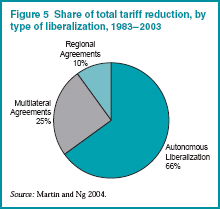Comments on a depressing must-read Katrina aftermath account went far afield, including a suggestion to leave the U.S., which among others prompted Anna Feruglio Dal Dan to comment:
Moving is not easy in this wonderful globalized society where barriers and stuff like that have to be taken out for the sake of the Market. The system depends on not letting people move around freely across borders.
I wonder about such things, so I had to ask:
How do you figure the market system depends on not letting people move? If people were free to move across borders would you expect the market system to crumble? Why?
Anna responded:
Because it would mean that a whole bunch of people who are paid a pittance in Rumania to make cheap bras would move to the UK to make them there for a helluva lot of more money. End of cheap labor. Collapse of affluent societies under the strain of immigration. Nobody left to buy the bras.
So I gather the argument is roughly as follows:
- Markets and/or affluence requires “cheap” labor (remember cheapness is always relative)
- By virtue of moving to affluent countries labor that was cheap will be expensive
- No more cheap goods due to lack of cheap labor
- Affluent societies collapse
I see one non-sequitur after another. However, if I thought affluence primarily results from exploitation of the non-affluent (as I suspect Anna does) rather than from high productivity (as I do) the argument would more or less make sense.
People moving from poor areas to wealthy areas would earn more, but probably not nearly as much as the typical already-weathy resident, largely because (e.g.) Rumanians aren’t as productive as Britons (due to poorer skills, not genetic inferiority; their descendents will be equally productive). Rumanians-in-the-U.K. will still be relatively cheap labor. (Wage controls could decrease their cheapness, but that will either result in lots of unemployed Rumanians-in-the-U.K. or not so many moving.)
We also have examples of lots of poor people being integrated into affluent economies, e.g., largely unrestricted European immigration into the U.S. around a century ago and (unfortunately) restricted but still large immigration into the U.S. from Mexico and elsewhere now. Two recent studies show that current immigration is having little effect on “native” wages–the already affluent can still afford to buy bras. American society didn’t and hasn’t collapsed.
A more interesting example may be post-apartheid South Africa. In some ways this may be a better model for what would happen in an open immigration world than U.S. immigration, as immigrants have never been a majority in the U.S., while (relatively poor) Africans are the majority in South Africa, as the relatively poor are the majority in the world (in other ways the proximity of relatively poor and wealthy societies in South Africa makes it a bad model–many Rumanians just aren’t going to move across a contient regardless of wage differentials).
I haven’t looked for post-apartheid wage data before (I plan to now), but a paper on Education and Racial Inequality in Post-Apartheid South Africa from last year seems to indicate that there is a decreased but still very large earnings differential between blacks and whites. Apparently there is still relatively cheap labor available to make bras, and South Africa hasn’t collapsed.
Anyhow, I find it amusing that both the marxist-influenced and the bigoted agree that open immigration would cause the collapse of American society, they just don’t agree on whether that would be a good thing!
I don’t think open immigration would destroy capitalism or end affluence (the opposite in both cases), but reagardless for moral reaons I think restrictions on movement and employment must be ended, roughly the same reasons South African Apartheid had to go.
Randolph Fritz also responded:
Mike, there is free movement of capital, but not of labor. Somehow I doubt that this is good for wages.
Not good for wages, but not as bad as both being restricted would be.
Both labor and capital should be free to seek their highest returns anywhere on earth. If they aren’t, they won’t obtain their highest returns, which is bad for wages.
